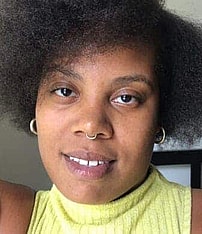When a report by the National Institutes of Health that found correlations between permanent hair treatments such as hair dyes and hair straighteners and an increased risk for hormonal cancers — including ovarian, breast, and uterine — in Black women was released in October, it made headlines and waves on social media. Now, it’s fueling a new campaign.
Color Of Change, the nation’s largest online racial justice organization, has launched a new campaign, #CareForBlackHair, to hold retailers selling these toxic products and the brands creating them accountable. The campaign calls for retailers to pull harmful haircare products from their shelves and for brands to change their formulations to nontoxic ingredients.

In an interview with theGrio, Color Of Change Vice President Jade Magnus Ogunnaike called the findings of the National Institutes of Health study “absolutely shocking.” She also said that while the harmfulness of hair dye is a major issue, the risk posed by hair straightening products really moved Color Of Change to take action.
“Hair relaxers are a product that’s directly related to Black women. Black women are the people who hair relaxers are marketed to. We are, I would imagine, some of the largest consumers of it. Any hair relaxer box that you see is going to have a Black woman on it. So as the largest racial justice organization, we saw a really important avenue for us to step in and talk to retailers and ask them to remove these products from their shelves,” said Ogunnaike.
#CareForBlackHair was launched in December 2022, though Color Of Change began reaching out to retailers in early November. Ogunnaike said she could not go into detail about all the retailers Color Of Change has approached; however, she did share that her organization recently had a disheartening conversation with supermarket retailer Giant Food.
“They said that they would not be removing the relaxers, and then they pointed us to a statement from a lobbying group that represents personal care products,” she said.
The statement from the lobbying group Personal Care Products Council, released in October in direct response to the study, said the “association” of these products with an increased risk of uterine cancer is not the same as the “causation” of the risk and that the study doesn’t consider other factors like age and lifestyle.
“That was obviously horrific for us to read, especially from a supermarket like Giant,” Ogunnaike said, adding, “It was horrific for us to read that information, specifically, because the letter came from a woman of color.”
Giant Food gave the following statement in response to an inquiry from theGrio:
“Giant Food continually reviews and assesses our product assortment to ensure it meets our high consumer satisfaction and safety standards. The products in question, like all cosmetics, are regulated by the U.S. Food and Drug Administration (FDA) under the Federal Food, Drug, and Cosmetic Act (FD&C Act) and the Fair Packaging and Labeling Act (FPLA). We will remain up to date on any inquiries on these products, but they continue to be deemed safe by these high regulatory standards.”
Ogunnaike said her interactions with Giant Food illustrate a specific challenge with retailers: They can hide behind lobby groups and ignore the science.
“This is a study that was done by the National Institutes of Health. It’s not some basement scientific lab,” she said. “This is a really official and well-regarded study. For Giant to dismiss Black women like that and to dismiss the risk of cancer like that was really, really disturbing.”
Regardless, Ogunnaike and Color Of Change are pushing forward. The issue couldn’t be more timely, with major retailers making an increased effort to market to Black people, especially with Black History Month just around the corner.
Ogunnaike said Color Of Change is asking for anyone interested to sign its petition and stay tuned for ways they can help make calls of action to retailers. In the future, Color Of Change is planning in-person events in the cities where these retailers are based.
Ogunnaike emphasized that Color Of Change isn’t against the practice of straightening one’s hair.
“We understand the complex decisions that Black women have to make around their hair, and we understand the relationship to their hair. We are totally agnostic to how Black women choose to style their hair,” Ogunnaike said. “What we are not agnostic about is corporations’ and retailers’ responsibility to consumers about the products that they are selling. It’s incredibly disturbing that in 2023, there is still such a negligent attitude toward Black women.”

Kay Wicker is a lifestyle writer for theGrio covering health, wellness, travel, beauty, fashion, and the myriad ways Black people live and enjoy their lives. She has previously created content for magazines, newspapers, and digital brands.
TheGrio is FREE on your TV via Apple TV, Amazon Fire, Roku, and Android TV. TheGrio’s Black Podcast Network is free too. Download theGrio mobile apps today! Listen to ‘Writing Black’ with Maiysha Kai.

